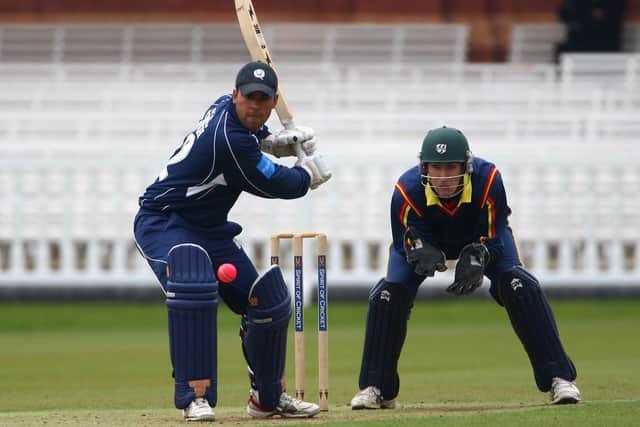Racism in Scottish cricket: The game's governing body needs to do more to tackle discrimination and prejudice – Foysol Choudhury
When Qasim Sheikh, a former Scotland international, spoke out about the horrific racism he had experienced in cricket, he had a right to expect that this would lead to real changes within the game. And when a report commissioned by sportscotland found that Cricket Scotland was “institutionally racist”, it should have removed any doubts that there was a serious problem and that urgent action was necessary.
The meaning of “institutional racism” can sometimes seem vague, but the report, produced last year by Plan4Sport, makes it clear. Assessed against 31 different indicators, Cricket Scotland failed on 29 and only partially met the other two. It failed to ensure selection processes were “fair and transparent”; its leadership failed to lead on and be responsible for tackling racism; it failed to ensure “a culture of banter involving racially aggravated language” was “not normalised”; it failed to ensure “racially aggravated bullying or harassment does not happen”… the list goes on. In total, the report’s authors found 448 “identified instances” where one of these indicators was breached.
Advertisement
Hide AdAdvertisement
Hide AdFollowing the publication of the ‘Changing the Boundaries’ report, we should be seeing concrete action by Cricket Scotland to turn themselves around on all these indicators of institutional racism which they had failed. We should be seeing a shift in the culture within Scottish cricket, so that the horrific abuse previously experienced by Qasim and others is no longer tolerated by the governing body.
However, after Qasim went public with his experiences, such was the extent of the abuse he received on social media that he has since suggested people in his situation should “think twice” before speaking out about racism and discrimination. And a year on from the report, the silence from Cricket Scotland over this abuse is palpable and the lack of real, effective action and leadership is unacceptable.
Cricket Scotland should be proactively speaking out against the abuse faced by Qasim, fellow former Scotland international Majid Haq and others associated with the sport, whether they are players, former players or umpires. Doing so would demonstrate that there has been a cultural shift within the game and that its governing body will no longer accept the perpetuation of racism and discrimination. It would also mean Cricket Scotland was addressing at least one previously failed indicator by showing leadership in the fight to prevent such abuse and taking responsibility to ensure that safeguards are in place to prevent future incidents. This would encourage victims of abuse to come forward and it would hold those responsible for perpetrating it accountable.
Instead, Cricket Scotland’s lack of action over Qasim’s ongoing abuse sadly does nothing to show there has been a real break from the past and will only further push victims’ experiences underground. If the abuse is allowed to continue unchecked by Cricket Scotland, I fear that people may be afraid to speak up about their experiences and the problem could be exacerbated, not resolved.
Whilst some recommendations made by the report have been met by Cricket Scotland, it has not gone far enough, with enough effort. It must go beyond doing the bare minimum it needs to meet the recommendations and instead proactively engage with communities about the report’s findings to build trust and understanding. This problem doesn’t need a tick-box exercise in PR. It needs concrete, immediate action.


Unless Cricket Scotland takes ownership of the Changing the Boundaries report’s findings and takes a leadership role in rooting out the culture which has enabled racism and discrimination within the sport, then their reports about supposed progress will not be worth the paper they are written on.
The Independent Commission for Equity in Cricket (ICEC) has recently delivered the findings of its investigation into English and Welsh cricket, which concluded that racism is also widespread there. Whilst there have been clear failings at the organisational level in Cricket Scotland, ICEC made it clear that racism is a wider problem in the sport in general. And reports of issues within Scottish rugby and Scottish football demonstrate that this is a problem for sport in general and it needs to be addressed as such.
Campaign group Running Out Racism’s recently published letter to the chief executives of Cricket Scotland and sportscotland and the sports minister asked to see more collaboration between the cricketing authorities in Scotland, England and Wales. This would build a shared understanding of how to reduce racism and increase a culture of equality, tolerance and respect. The group also said this was an opportunity to make changes at a higher level, to ensure scrutiny and safeguarding in all sports in Scotland.
Advertisement
Hide AdAdvertisement
Hide AdMaking another more general point, Running Out Racism raised concerns about governing bodies having a role as both promoter and regulator, with the risk that this creates a temptation to cover up problems. They’ve called for the Scottish Government and sportscotland to review how all sports should be held accountable and how safeguards are put in place to prevent and tackle problems like racism and discrimination.
Sport should be a space which fosters inclusion, diversity and acceptance, a place where there is accountability and people feel able to raise their concerns. It should be a place where children and adults alike can go to develop skills, hobbies and social networks, rather than a space for persecution. Action is needed now. I welcome Running Out Racism’s recommendations and call on Cricket Scotland, sportscotland and the Scottish Government to act to root out racism in cricket and in all sport in Scotland, for the sake of the players, young athletes and society as a whole.
Foysol Choudhury is a Labour MSP for Lothian
Comments
Want to join the conversation? Please or to comment on this article.
